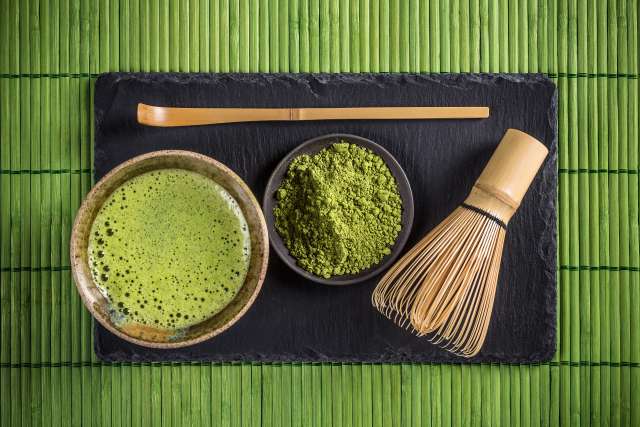A global shortage of matcha has led to rising prices, empty shelves and a search for alternatives to the specialized tea.
Matcha, a finely ground powder made from specially grown and processed tencha leaves, has long been prized in Japanese culture for its role in traditional tea ceremonies and its beneficial health impacts.
Those benefits, and its gentler caffeine profile compared to coffee, have in recent years made matcha popular around the world. Demand for premium Japanese matcha has particularly grown in North America and Europe, where it is used in lattes, smoothies and baked goods.
Currently, that demand is outpacing supply, leading to rising costs and limited overall availability.
For answers to commonly asked questions about matcha, its health benefits, risks and alternatives, we turned to Yasi Ansari, MS, RDN, CSSD, senior dietitian at UCLA Health Santa Monica.
Q: What is unique about matcha?
Ansari: Creating high-quality matcha requires careful cultivation, including shading tea plants before harvest, which limits how much can be produced each year.
Unlike steeped tea, where the leaves are discarded, matcha involves consuming the whole leaf in powdered form, which concentrates its nutrients and antioxidants.
Q: How does matcha nutritionally compare to other hot drinks like non-matcha green tea, black tea or coffee?
Ansari: Coffee contains the most caffeine, followed by matcha and then regular green tea. Matcha is unique because it contains L-theanine, an amino acid that slows caffeine absorption. This often means fewer jitters and less upset stomach compared to coffee.
Matcha contains four main antioxidants known as catechins: EC, ECG, EGC, and EGCG. Of these, EGCG is the most powerful.
Studies show matcha provides up to 137 times more EGCG than standard green tea. This is one reason matcha is often highlighted for its potential health benefits.
Q: What does research say about the health benefits?
Ansari: Studies show matcha may support cardiovascular health, brain function and possibly metabolism. The caffeine + L-theanine combination has been shown to help improve focus and attention.
Traditional uses of green tea include aiding digestion, regulating blood sugar and supporting mental well-being. Some small studies suggest the L-theanine in matcha may help with stress management and sleep quality, and on its own, L-theanine is linked to better sleep and relaxation.
However, when it comes to sports nutrition, a three-week study of green tea extract found no significant improvement in performance among endurance-trained men.
More research is needed before we can say matcha directly benefits exercise or energy metabolism.
Q: Are there risks to drinking matcha regularly?
Ansari: The main consideration is caffeine. Consuming too much caffeine can lead to high blood pressure, anxiety, sleep disturbances, nausea or headaches.
One cup of matcha (about 1 teaspoon of powder) contains roughly 60–70 mg of caffeine. For adults, up to 400mg per day is generally considered safe, but tolerance varies.
Q: Does preparation affect matcha’s health benefits?
Ansari: Yes. Whisking matcha in hot (not boiling) water helps preserve its flavor and antioxidant content. Adding milk may slightly reduce antioxidant absorption, but the effect is small in the context of a balanced diet.
What’s more important is added sugar. Sweetened matcha drinks, such as some café lattes, can contain high sugar levels that offset potential health benefits if frequently consumed.
Q: What are good alternatives if matcha is too expensive or unavailable?
Ansari: There are several options, and each have their benefits.
- Green tea provides catechins, though at lower levels than matcha
- Black and oolong tea are rich in antioxidants and contain caffeine
- Coffee is linked to lower risk of certain chronic diseases when consumed in moderation
- Herbal teas like rooibos or hibiscus are caffeine-free, antioxidant-rich, and supportive of hydration
Q: How much matcha is safe to drink daily?
Ansari: Up to 4–5 cups of matcha can fit within safe caffeine limits for adults, but 1–2 cups per day is ideal and a better recommendation for supporting tolerance. Pay attention to how you feel, especially if you also consume other caffeinated drinks.
Q: Any final advice for consumers?
Ansari: It’s important to remember that no single food or drink is a “magic bullet.” Matcha can be a wonderful part of a balanced routine, alongside nutrient-rich foods, movement, sleep and stress management.
For people who are sensitive to coffee, matcha can be a good alternative. The ritual of preparing matcha can also bring a mindfulness benefit to your day.
Making a matcha drink yourself allows you to adjust sweetness, creaminess and flavor to your liking while keeping the health benefits intact. Personally, I love adding rose water to my matcha.



